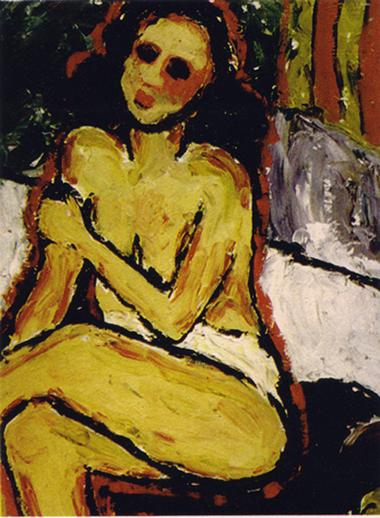Gwen (painting): Difference between revisions
m (1 revision) |
RachelShuman (talk | contribs) No edit summary |
||
| (3 intermediate revisions by the same user not shown) | |||
| Line 1: | Line 1: | ||
====Date: [[:Category: | ====Date: [[:Category: 1995|1995]]==== | ||
====Region: [[:Category:North America|North America | ====Region: [[:Category:North America|North America]]==== | ||
====Subject: [[:Category:Nudity|Nudity | ====Subject: [[:Category:Nudity|Nudity]]==== | ||
====Medium: [[:Category:Painting|Painting | ====Medium: [[:Category:Painting|Painting]]==== | ||
---- | ---- | ||
[[File:Gwen.jpg|right|200 px|frame|Image obtained from the Thomas Jefferson Center for the Protection of Free Expression ''Art on Trial'' site]] | |||
'''Artist:''' Maxine Henderson | '''Artist:''' Maxine Henderson | ||
| Line 17: | Line 20: | ||
'''Description of Artwork:''' This oil painting depicts a seated nude woman with crossed arms and legs; one of her breasts is partially exposed. | '''Description of Artwork:''' This oil painting depicts a seated nude woman with crossed arms and legs; one of her breasts is partially exposed. | ||
'''The Incident:''' After viewing the painting, Laurie Crowder submitted a sexual harassment complaint to the city Legal Department. She claimed that City Hall was her workplace, and the painting made it a hostile environment. City officials therefore removed the painting | '''The Incident:''' After viewing the painting, Laurie Crowder submitted a sexual harassment complaint to the city's Legal Department. She claimed that City Hall was her workplace, and the painting made it a hostile environment. City officials therefore removed the painting | ||
'''Results of Incident:''' Henderson filed a suit against the city for violating her First Amendment rights. On March 27, 1997, a U.S. district judge ruled in favor of Henderson, noting the fact that it was a public space. The city's art policy was changed to give the city manager, who enforces harassment policies, final say over rotunda displays. | '''Results of Incident:''' Henderson filed a suit against the city for violating her First Amendment rights. On March 27, 1997, a U.S. district judge ruled in favor of Henderson, noting the fact that it was a public space. The city's art policy was changed to give the city manager, who enforces harassment policies, final say over rotunda displays. | ||
| Line 23: | Line 26: | ||
'''Source:''' The Tennessean, 3.1.96, Time Magazine, 3.23.98, NCAC | '''Source:''' The Tennessean, 3.1.96, Time Magazine, 3.23.98, NCAC | ||
[[Category: | [[Category:1995]] | ||
[[Category:]] | [[Category:1990s]] | ||
[[Category:]] | [[Category:20th century]] | ||
[[Category:North America]] | [[Category:North America]] | ||
[[Category:]] | [[Category:United States]] | ||
[[Category:]] | [[Category:Tennessee]] | ||
[[Category:Nudity]] | [[Category:Nudity]] | ||
[[Category:Painting]] | [[Category:Painting]] | ||
[[Category:Maxine Henderson]] | [[Category:Maxine Henderson]] | ||
{{DISPLAYTITLE:<span style="font-style: italic;">Gwen</span> (painting)}} | |||
__NOTOC__ | __NOTOC__ | ||
Latest revision as of 19:17, 28 July 2011
Date: 1995
Region: North America
Subject: Nudity
Medium: Painting
Artist: Maxine Henderson
Confronting Bodies: Laurie Crowder, an assistant superintendent for Murfreesboro City Schools; City Officials
Dates of Action: October 1995
Location: City Hall rotunda, Murfreesboro, Tennessee
Description of Artwork: This oil painting depicts a seated nude woman with crossed arms and legs; one of her breasts is partially exposed.
The Incident: After viewing the painting, Laurie Crowder submitted a sexual harassment complaint to the city's Legal Department. She claimed that City Hall was her workplace, and the painting made it a hostile environment. City officials therefore removed the painting
Results of Incident: Henderson filed a suit against the city for violating her First Amendment rights. On March 27, 1997, a U.S. district judge ruled in favor of Henderson, noting the fact that it was a public space. The city's art policy was changed to give the city manager, who enforces harassment policies, final say over rotunda displays.
Source: The Tennessean, 3.1.96, Time Magazine, 3.23.98, NCAC
